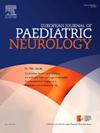Harmful metabolic acidosis in children treated by ketogenic diet during prolonged general anesthesia for epilepsy surgery: A single center experience
IF 2.3
3区 医学
Q3 CLINICAL NEUROLOGY
引用次数: 0
Abstract
Objective
Management of ketogenic diet (KD) in case of prolonged anesthesia in children.
Methods
We conducted a retrospective study in the pediatric neurosurgery department of Rothschild Hospital Foundation in France. All the children who underwent long term anesthesia (>4h) in case of neurosurgery for drug resistant pediatric epilepsy surgery between September 2020 and January 2024 were included, excluding patients with suspected metabolic disorder or without blood sample. Children were analyzed in three subgroups: Children under regular diet before surgery constituted the Non-KD group; strict maintenance of KD with no carbohydrate intake during surgery constituted the KD-S group (stringent); carbohydrate intravenous intake during surgery in a patient treated by KD represented the KD-B group (broken).
Results
22 patients were included, among whom 6 under ketogenic diet (KD). After 4 h of anesthesia, children maintained in strict ketogenic diet (KD-S, n = 3) exhibited non-lactic metabolic acidosis (pH 7.13 vs 7.34, p = 1.38x10−9) associated with an increased anionic gap (17.1 mM vs 9.6 mM, p = 1.58 x10−4).
Significance
Current recommendations for anesthesia during long term anesthesia (>4h) with strict no-carbohydrate intake during anesthesia in case ok KD may be at risk of life-threatening metabolic acidosis, in a context of absence of protocolized monitoring of variations in hyperketosis throughout a prolonged fast. A KD-management protocol, including routine monitoring of ketosis in addition to usual monitoring (lactacidemia, kaliemia and glycemia), and low carbohydrates intravenous perfusion throughout prolonged general anesthesia, should be implemented throughout prolonged general anesthesia, especially for infants younger than 2 years.
癫痫手术长时间全麻期间生酮饮食治疗的儿童有害代谢性酸中毒:单中心经验。
目的:探讨儿童长时间麻醉时生酮饮食的管理。方法:我们在法国罗斯柴尔德医院基金会儿童神经外科进行回顾性研究。纳入所有在2020年9月至2024年1月期间接受耐药儿童癫痫手术神经外科长期麻醉(bbb4h)的儿童,排除疑似代谢紊乱或无血液样本的患者。将儿童分为三个亚组进行分析:术前饮食正常的儿童为非kd组;术中严格维持KD,不摄入碳水化合物组为KD- s组(严格组);1例接受KD治疗的患者手术期间静脉碳水化合物摄取量为KD- b组(断)。结果:纳入22例患者,其中6例采用生酮饮食。麻醉4小时后,维持严格生酮饮食(KD-S, n = 3)的儿童表现出非乳酸代谢性酸中毒(pH值7.13 vs 7.34, p = 1.38x10-9),并伴有阴离子间隙增加(17.1 mM vs 9.6 mM, p = 1.58 x10-4)。意义:目前的建议是,在长期麻醉(bbb4h)期间,在麻醉期间严格无碳水化合物摄入,以防ok KD可能有危及生命的代谢性酸中毒风险,在缺乏长时间禁食期间高酮血症变化监测的情况下。在延长全麻期间,特别是2岁以下的婴儿,应实施kd管理方案,包括在常规监测(乳酸血症、钾血症和血糖)的基础上,对酮症进行常规监测,并在长时间全麻期间进行低碳水化合物静脉灌注。
本文章由计算机程序翻译,如有差异,请以英文原文为准。
求助全文
约1分钟内获得全文
求助全文
来源期刊
CiteScore
6.30
自引率
3.20%
发文量
115
审稿时长
81 days
期刊介绍:
The European Journal of Paediatric Neurology is the Official Journal of the European Paediatric Neurology Society, successor to the long-established European Federation of Child Neurology Societies.
Under the guidance of a prestigious International editorial board, this multi-disciplinary journal publishes exciting clinical and experimental research in this rapidly expanding field. High quality papers written by leading experts encompass all the major diseases including epilepsy, movement disorders, neuromuscular disorders, neurodegenerative disorders and intellectual disability.
Other exciting highlights include articles on brain imaging and neonatal neurology, and the publication of regularly updated tables relating to the main groups of disorders.

 求助内容:
求助内容: 应助结果提醒方式:
应助结果提醒方式:


